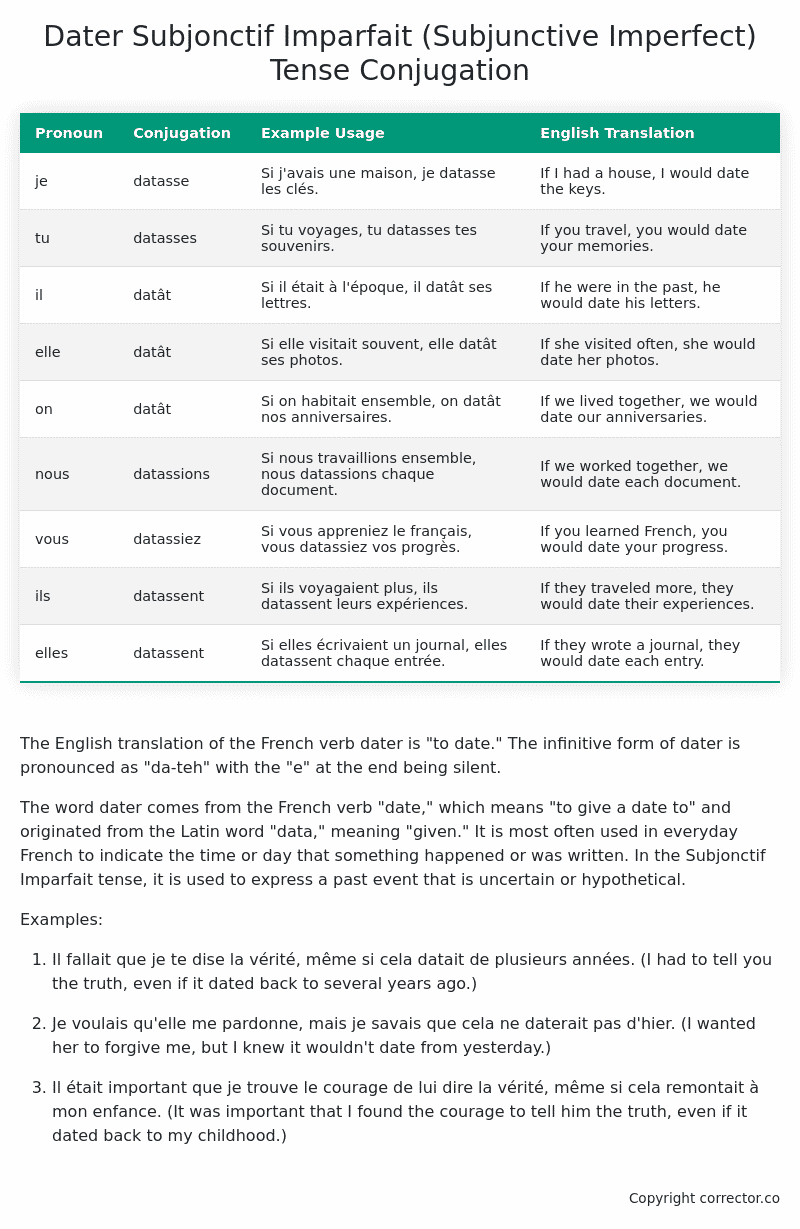Subjonctif Imparfait (Subjunctive Imperfect) Tense Conjugation of the French Verb dater
Introduction to the verb dater
The English translation of the French verb dater is “to date.” The infinitive form of dater is pronounced as “da-teh” with the “e” at the end being silent.
The word dater comes from the French verb “date,” which means “to give a date to” and originated from the Latin word “data,” meaning “given.” It is most often used in everyday French to indicate the time or day that something happened or was written. In the Subjonctif Imparfait tense, it is used to express a past event that is uncertain or hypothetical.
Examples:
-
Il fallait que je te dise la vérité, même si cela datait de plusieurs années. (I had to tell you the truth, even if it dated back to several years ago.)
-
Je voulais qu’elle me pardonne, mais je savais que cela ne daterait pas d’hier. (I wanted her to forgive me, but I knew it wouldn’t date from yesterday.)
-
Il était important que je trouve le courage de lui dire la vérité, même si cela remontait à mon enfance. (It was important that I found the courage to tell him the truth, even if it dated back to my childhood.)
Table of the Subjonctif Imparfait (Subjunctive Imperfect) Tense Conjugation of dater
| Pronoun | Conjugation | Example Usage | English Translation |
|---|---|---|---|
| je | datasse | Si j’avais une maison, je datasse les clés. | If I had a house, I would date the keys. |
| tu | datasses | Si tu voyages, tu datasses tes souvenirs. | If you travel, you would date your memories. |
| il | datât | Si il était à l’époque, il datât ses lettres. | If he were in the past, he would date his letters. |
| elle | datât | Si elle visitait souvent, elle datât ses photos. | If she visited often, she would date her photos. |
| on | datât | Si on habitait ensemble, on datât nos anniversaires. | If we lived together, we would date our anniversaries. |
| nous | datassions | Si nous travaillions ensemble, nous datassions chaque document. | If we worked together, we would date each document. |
| vous | datassiez | Si vous appreniez le français, vous datassiez vos progrès. | If you learned French, you would date your progress. |
| ils | datassent | Si ils voyagaient plus, ils datassent leurs expériences. | If they traveled more, they would date their experiences. |
| elles | datassent | Si elles écrivaient un journal, elles datassent chaque entrée. | If they wrote a journal, they would date each entry. |
Other Conjugations for Dater.
Le Present (Present Tense) Conjugation of the French Verb dater
Imparfait (Imperfect) Tense Conjugation of the French Verb dater
Passé Simple (Simple Past) Tense Conjugation of the French Verb dater
Passé Composé (Present Perfect) Tense Conjugation of the French Verb dater
Futur Simple (Simple Future) Tense Conjugation of the French Verb dater
Futur Proche (Near Future) Tense Conjugation of the French Verb dater
Plus-que-parfait (Pluperfect) Tense Conjugation of the French Verb dater
Passé Antérieur (Past Anterior) Tense Conjugation of the French Verb dater
Futur Antérieur (Future Anterior) Tense Conjugation of the French Verb dater
Subjonctif Présent (Subjunctive Present) Tense Conjugation of the French Verb dater
Subjonctif Passé (Subjunctive Past) Tense Conjugation of the French Verb dater
Subjonctif Imparfait (Subjunctive Imperfect) Tense Conjugation of the French Verb dater (this article)
Subjonctif Plus-que-parfait (Subjunctive Pluperfect) Tense Conjugation of the French Verb dater
Conditionnel Présent (Conditional Present) Tense Conjugation of the French Verb dater
Conditionnel Passé (Conditional Past) Tense Conjugation of the French Verb dater
L’impératif Présent (Imperative Present) Tense Conjugation of the French Verb dater
L’infinitif Présent (Infinitive Present) Tense Conjugation of the French Verb dater
Struggling with French verbs or the language in general? Why not use our free French Grammar Checker – no registration required!
Get a FREE Download Study Sheet of this Conjugation 🔥
Simply right click the image below, click “save image” and get your free reference for the dater Subjonctif Imparfait tense conjugation!

Dater – About the French Subjonctif Imparfait (Subjunctive Imperfect) Tense
Formation
Common Everyday Usage Patterns
Interactions with Other Tenses
Subjonctif Présent
Indicatif Passé Composé
Conditional
Conditional Perfect
Summary
I hope you enjoyed this article on the verb dater. Still in a learning mood? Check out another TOTALLY random French verb conjugation!


